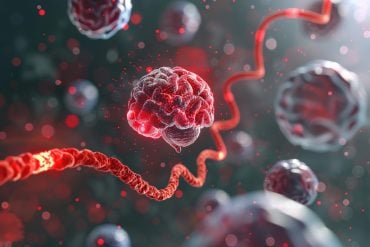Summary: The presence of the MECP2 protein in parvalbumin (PV) neurons is crucial for newly-mothering mice to rapidly learn and respond to their pups’ distress cries, hinting at how the brain rewires during pivotal adult learning phases.
When MECP2 is absent, maternal mice show neglectful behavior toward their young, illuminating how the protein’s dysfunction could contribute to communication and interpretation deficits in neurodevelopmental disorders like Rett syndrome in humans.
Furthermore, the work illuminates the versatility of the brain’s circuits, which, though they solidify as we age, retain the capacity for significant rewiring during specific life events.
This pivotal study opens new avenues, potentially pointing towards the brain circuits implicated in common neurological conditions and providing a framework to explore treatments.
Key Facts:
- Crucial for Motherhood: In mice, the MECP2 protein, particularly in PV neurons, is critical for enabling new mothers to learn and adequately respond to their offspring’s needs.
- Link to Rett Syndrome: In humans, MECP2 dysfunction is responsible for Rett syndrome, and this research underscores a potential pathway to understanding and treating the neurodevelopmental disorder and other similar conditions.
- Adaptability of Brain Circuits: While the brain’s circuits tend to stabilize with age, certain life experiences, like motherhood, can reactivate mechanisms to repurpose and rewire them, which could have broader implications for understanding brain disorders emerging later in life.
Source: CSHL
Developing brains become shaped by the sights, sounds, and experiences of early life. The brain’s circuits grow more stable as we age. However, some experiences later in life open up opportunities for these circuits to be rapidly rewired.
New research from Cold Spring Harbor Laboratory Associate Professor Stephen Shea helps explain how the brain adapts during a critical period of adulthood: the time when new mothers learn to care for their young.
Shea’s work in mice shows how this learning process is disrupted when a small set of neurons lack a protein called MECP2. In humans, MECP2 dysfunction causes the rare neurodevelopmental disorder Rett syndrome.
Shea’s findings could point researchers toward the brain circuits involved in Rett syndrome and potential treatment strategies. His research could also have implications for more common neurological conditions. Shea explains:
“It’s not lost on us that Rett syndrome patients have difficulty interpreting and producing language. Difficulties with communicating are widespread in autism spectrum disorders. One of the reasons we study Rett syndrome is that this may be a valuable model for other forms of autism.”
The Shea lab’s studies of MECP2 began about 10 years ago when he first learned that female mice with mutations in the Mecp2 gene are poor parents. When it comes to parenting, most mother mice are quick learners. But without adequate MECP2 protein, Shea says, “they neglect their children and don’t listen to their cries.”
Shea and his team tested how eliminating MECP2 from specific cells in the mouse brain affected maternal behavior. They found that for pup retrieval to be delayed, the protein only had to go missing from a small subset of cells in a sound-processing part of the brain. The crucial cells are known as parvalbumin (PV) neurons. To efficiently learn to retrieve their pups, mice need MECP2 in those specific brain cells when they first hear the young animals’ cries of distress.
Shea points out that PV neurons also play an essential role in brain circuits earlier in life. These cells normally dampen the signals of other neurons. But they release this inhibition during development, creating conditions that are favorable for change. Shea says:
“We find that some of the same mechanisms engaged in development are actually at play in adults. They can be reactivated and repurposed for rewiring the brain in a new life time point.”
In other words, it’s not just about development or adulthood. This research may provide clues about brain disorders that arise later on, like dementia and Alzheimer’s disease.
About this genetics and neuroscience research news
Author: Samuel Diamond
Source: CSHL
Contact: Samuel Diamond – CSHL
Image: The image is credited to Neuroscience News
Original Research: Closed access.
“Selective deletion of Methyl CpG binding protein 2 from parvalbumin interneurons in the auditory cortex delays the onset of maternal retrieval in mice” by Stephen Shea et al. Journal of Neuroscience
Abstract
Selective deletion of Methyl CpG binding protein 2 from parvalbumin interneurons in the auditory cortex delays the onset of maternal retrieval in mice
Mutations in MECP2 cause the neurodevelopmental disorder Rett syndrome. MECP2 codes for methyl CpG binding protein 2 (MECP2), a transcriptional regulator that activates genetic programs for experience-dependent plasticity.
Many neural and behavioral symptoms of Rett syndrome may result from dysregulated timing and thresholds for plasticity.
As a model of adult plasticity, we examine changes to auditory cortex inhibitory circuits in female mice when they are first exposed to pups; this plasticity facilitates behavioral responses to pups emitting distress calls.
Brainwide deletion of Mecp2 alters expression of markers associated with GABAergic parvalbumin interneurons (PVins) and impairs the emergence of pup retrieval.
We hypothesized that loss of Mecp2 in PVins disproportionately contributes to the phenotype.
Here, we find that deletion of Mecp2 from PVins delayed the onset of maternal retrieval behavior and recapitulated the major molecular and neurophysiological features of brainwide deletion of Mecp2.
We observed that when PVin-selective mutants were exposed to pups, auditory cortical expression of PVin markers increased relative to that in wild-type littermates.
PVin-specific mutants also failed to show the inhibitory auditory cortex plasticity seen in wild-type mice on exposure to pups and their vocalizations. Finally, using an intersectional viral genetic strategy, we demonstrate that postdevelopmental loss of Mecp2 in PVins of the auditory cortex is sufficient to delay onset of maternal retrieval.
Our results support a model in which PVins play a central role in adult cortical plasticity and may be particularly impaired by loss of Mecp2.








